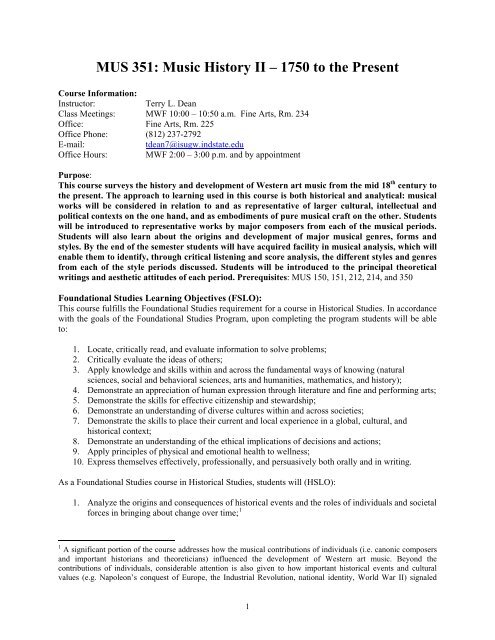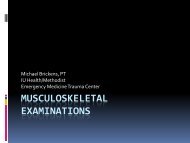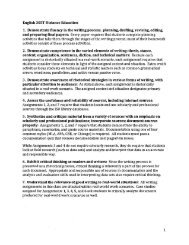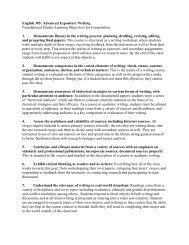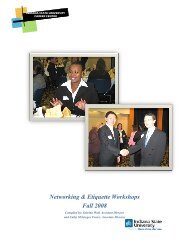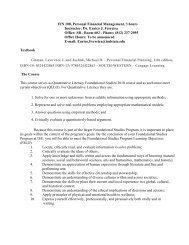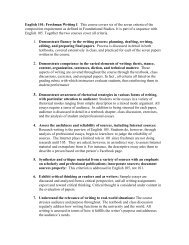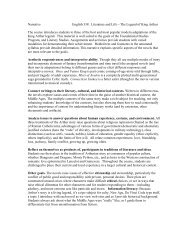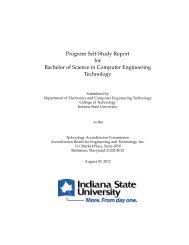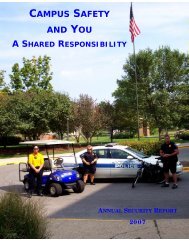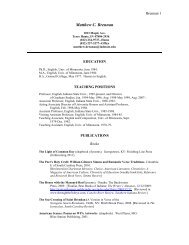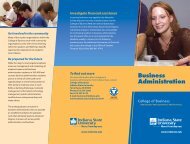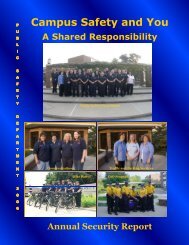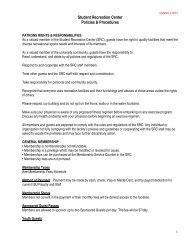MUS 351 - Indiana State University
MUS 351 - Indiana State University
MUS 351 - Indiana State University
Create successful ePaper yourself
Turn your PDF publications into a flip-book with our unique Google optimized e-Paper software.
<strong>MUS</strong> <strong>351</strong>: Music History II – 1750 to the Present<br />
Course Information:<br />
Instructor:<br />
Terry L. Dean<br />
Class Meetings: MWF 10:00 – 10:50 a.m. Fine Arts, Rm. 234<br />
Office: Fine Arts, Rm. 225<br />
Office Phone: (812) 237-2792<br />
E-mail:<br />
tdean7@isugw.indstate.edu<br />
Office Hours: MWF 2:00 – 3:00 p.m. and by appointment<br />
Purpose:<br />
This course surveys the history and development of Western art music from the mid 18 th century to<br />
the present. The approach to learning used in this course is both historical and analytical: musical<br />
works will be considered in relation to and as representative of larger cultural, intellectual and<br />
political contexts on the one hand, and as embodiments of pure musical craft on the other. Students<br />
will be introduced to representative works by major composers from each of the musical periods.<br />
Students will also learn about the origins and development of major musical genres, forms and<br />
styles. By the end of the semester students will have acquired facility in musical analysis, which will<br />
enable them to identify, through critical listening and score analysis, the different styles and genres<br />
from each of the style periods discussed. Students will be introduced to the principal theoretical<br />
writings and aesthetic attitudes of each period. Prerequisites: <strong>MUS</strong> 150, 151, 212, 214, and 350<br />
Foundational Studies Learning Objectives (FSLO):<br />
This course fulfills the Foundational Studies requirement for a course in Historical Studies. In accordance<br />
with the goals of the Foundational Studies Program, upon completing the program students will be able<br />
to:<br />
1. Locate, critically read, and evaluate information to solve problems;<br />
2. Critically evaluate the ideas of others;<br />
3. Apply knowledge and skills within and across the fundamental ways of knowing (natural<br />
sciences, social and behavioral sciences, arts and humanities, mathematics, and history);<br />
4. Demonstrate an appreciation of human expression through literature and fine and performing arts;<br />
5. Demonstrate the skills for effective citizenship and stewardship;<br />
6. Demonstrate an understanding of diverse cultures within and across societies;<br />
7. Demonstrate the skills to place their current and local experience in a global, cultural, and<br />
historical context;<br />
8. Demonstrate an understanding of the ethical implications of decisions and actions;<br />
9. Apply principles of physical and emotional health to wellness;<br />
10. Express themselves effectively, professionally, and persuasively both orally and in writing.<br />
As a Foundational Studies course in Historical Studies, students will (HSLO):<br />
1. Analyze the origins and consequences of historical events and the roles of individuals and societal<br />
forces in bringing about change over time; 1<br />
1 A significant portion of the course addresses how the musical contributions of individuals (i.e. canonic composers<br />
and important historians and theoreticians) influenced the development of Western art music. Beyond the<br />
contributions of individuals, considerable attention is also given to how important historical events and cultural<br />
values (e.g. Napoleon’s conquest of Europe, the Industrial Revolution, national identity, World War II) signaled<br />
1
2. Explain historical events and changes as a continuous movement through time rather than as<br />
discrete and disconnected moments in time; 2<br />
3. Locate and evaluate sources of evidence within the context of time, place, and culture; and 3<br />
4. Use an historical perspective to understand the world today and address contemporary issues. 4<br />
Ultimately, the course is designed to develop skills directly related to applied learning. As such, the<br />
course will (S&ALO):<br />
1. Contribute to the development of critical thinking skills; 5<br />
2. Contribute to the development of information literacy skills; and 6<br />
3. Include a graded developmental writing component. 7<br />
Required Texts:<br />
1. J. Peter Burkholder, Donald Jay Grout, and Claude V. Palisca, A History of Western Music, 8th<br />
ed. (New York: W. W. Norton, 2010).<br />
2. Norton Anthology of Western Music [NAWM], vol. 2: Classical and Romantic, 6th ed., J. Peter<br />
Burkholder and Claude V. Palisca, eds. (New York: W. W. Norton, 2010).<br />
3. Norton Anthology of Western Music [NAWM], vol. 3: Twentieth Century, 6th ed., J. Peter<br />
Burkholder and Claude V. Palisca, eds. (New York: W. W. Norton, 2010).<br />
important change in music aesthetics and compositional practices throughout Europe and the United <strong>State</strong>s. [FSLO<br />
4, 6, 7]<br />
2 Much of the music examined as part of this course is linked by genre. As such, one of the main focuses of the<br />
course is the historical development of genres, for instance symphony, opera, concerto, and sonata. Moreover, some<br />
historical concepts (e.g. Industrial revolution and the creation of strong nationalistic sensitivities) are explored as<br />
long-lasting influences, the significance of which continued beyond the music of a single period in time.<br />
3 The Weiss/Taruskin text contains a collection of historical source readings that provide contemporaneous accounts<br />
of music making, aesthetic values, and performance reviews of the music discussed in the text. These source<br />
readings primary documents and serve as the historical backdrop against which the music analysis occurs, thus<br />
allowing students to see how the various compositions discussed in class serve as documents of the times during<br />
which they were composed. Although these documents will be used throughout the semester, documents related<br />
specifically to the controversial premiere of Igor Stravinsky’s Rite of Spring will be used as part of a larger project<br />
that will culminate in an essay exploring the reception of the work at the time of its premiere. [HSLO 1, 2, 3, 4]<br />
4 The Living Composer Project is designed to allow students an opportunity to discuss how music composed today<br />
is a product of (literally) centuries of influence by earlier composers, works, historical events, etc. By interviewing a<br />
living composer, students are made aware of not only the problems faced by modern composers, but how these<br />
individuals tackle the challenges they encounter, how they make their living, how they are trained, how they music<br />
reflects their various influences, and their opinions about the current state of Western art music composition.<br />
Ultimately, this project is to reinforce the notion that the composition of music is a living/breathing art form.<br />
5 One of the goals of the course is to provide students with a core repertory of musical works against which they can<br />
compare unknown works of music when they encounter them. By drawing upon their knowledge of these<br />
representative compositions, students can then employ critical thinking skills and make informed decisions about the<br />
possible historical, cultural, and/or stylistic origins of unknown works of music.<br />
6 Part of the process students go through for the developmental writing projects includes the development of a<br />
proposal and annotated bibliography. This bibliography is developed in conjunction with the music librarian who<br />
provides separate, mandatory workshops on bibliographic techniques and the use of library catalogs and databases.<br />
The topics of these workshops are larged geared toward the use of electronic library resources, and specifically those<br />
in the field of music. In addition to the traditional full-text databases such as JSTOR, music students learn to use<br />
electronic resources in the field, enabling them to access streaming audio and video materials as well as electronic<br />
versions of music scores. Advanced and Honors Program students also work with a librarian to learn to use EndNote<br />
software in order to develop better information and bibliographic management resources and skills. [FSLO 1, 10]<br />
7 All major writing assignments for this course are developmental and address all four major stages of the writing<br />
process: Planning/Development, Drafting, Revising, and Editing. [FSLO 1, 2, 3, 10]<br />
2
4. Norton Recorded Anthology of Western Music, vol. 2: Classical and Romantic, 6th ed., J. Peter<br />
Burkholder and Claude V. Palisca, eds. (New York: W. W. Norton, 2010).<br />
5. Norton Recorded Anthology of Western Music, vol. 3: Twentieth Century, 6th ed., J. Peter<br />
Burkholder and Claude V. Palisca, eds. (New York: W. W. Norton, 2010).<br />
6. Weiss, Piero and Richard Taruskin, eds. Music in the Western World: A History in Documents,<br />
2nd ed. (Belmont, CA: Thomson Higher Education, 2008).<br />
Optional Resource: Turabian, Kate L. A Manual for Writers of Term Papers, Theses, and Dissertations.<br />
Seventh Edition. Chicago: The <strong>University</strong> of Chicago Press, 2007. ISBN 0-226-82337-7<br />
*** The anthology will be utilized in virtually every scheduled class. It is required that every student<br />
brings the anthology to every class.<br />
Course Policies<br />
Attendance: Class attendance is an essential and integral part of your educational experience. Each<br />
student will be allowed to be absent for 2 class meetings without any negative effect on your final grade.<br />
Excused absences must be reported to the instructor before the class for which the student will be absent.<br />
Excused absences include personal injury or illness (with proper medical documentation only), family<br />
emergency, and conflicting departmental activities (tours, performances, etc.). Beginning with the third<br />
unexcused absence, each day a student is not present in class will lower the final grade by 5 points. Also,<br />
you must attend each class in its entirety. Therefore, you are expected to arrive on time and remain in<br />
class until you are dismissed by the instructor.<br />
Classroom Etiquette: Turn off cell phones and pagers prior to the beginning of class. Disruptive behavior<br />
will not be tolerated in the classroom, either. Talking with your friends, enjoying your breakfast, or<br />
sleeping are examples of unacceptable behavior. The instructor reserves the right to determine what is<br />
proper and improper behavior in the classroom. If the behavior of a student becomes a problem, you will<br />
receive one warning from the instructor. If the problem persists the student will be asked to leave the<br />
class, perhaps permanently.<br />
Make-up Policy: No make-up quizzes will be given. Make up exams are at the discretion of the instructor<br />
and require prior arrangement. Written work must be turned on the announced date; late work will not be<br />
accepted.<br />
Academic Honesty: I cannot give you credit for work that is not your own. Plagiarism and other forms of<br />
cheating will not be tolerated. Depending of the nature of the assignment and the seriousness of the<br />
offense, penalties range from no credit given for the assignment, to a failing grade in the course, to<br />
suspension or expulsion as determined by Student Judicial Programs. Consult your copy of The Code of<br />
Student Conduct for more information about the <strong>University</strong>’s policy on academic integrity.<br />
<strong>University</strong> Policies: The <strong>University</strong> has policies regarding academic freedom, students with disabilities<br />
and other matters. Information related to these policies is available for your review at the following<br />
address:<br />
http://www.indstate.edu/gened/docs/Foundational%20Studies/Info%20on%20Sycamore%20Standard%2<br />
0and%20ADA%20and%20Laptops%20and%20Academic%20Freedom.pdf<br />
Laptop Usage Forbidden: While the university has chosen to require laptops of its students, the university<br />
also recognizes and respects the right of faculty to conduct their classes as they deem appropriate. In this<br />
course, no laptop may be used. Failure to comply with this direction is a violation of the Code of Student<br />
Conduct.<br />
Academic Integrity:<br />
The <strong>University</strong> Standards statement of Academic Dishonesty (Part I, Section 1) is: “Because academic<br />
integrity is a cornerstone of the <strong>University</strong>’s commitment to the principles of free inquiry, students are<br />
responsible for learning and upholding professional standards in research, writing, assessment, and ethics.<br />
In the academic community the high value of honesty mandates a corresponding intolerance of<br />
dishonesty. Written or other work which students submit must be the product of their own efforts and<br />
3
must be consistent with appropriate standards of professional ethics. Academic dishonesty, which<br />
includes cheating, plagiarism, and other forms of dishonest or unethical behavior, is prohibited.” Please<br />
consult the <strong>Indiana</strong> <strong>State</strong> <strong>University</strong> Code of Student Conduct for more specific information regarding<br />
academic integrity.<br />
<strong>Indiana</strong> <strong>State</strong> <strong>University</strong> seeks to provide effective services and accommodation for qualified individuals<br />
with documented disabilities. If you need an accommodation because of a documented disability, you are<br />
required to register with Disability Support Services at the beginning of the semester. Contact the<br />
Director of Student Support Services. The telephone number is 237-2301and the office is located in<br />
Gillum Hall, Rm. 202A. The Director will ensure that you receive all the additional help that <strong>Indiana</strong><br />
<strong>State</strong> <strong>University</strong> offers.<br />
If you will require assistance during an emergency evacuation, notify your instructor immediately. Look<br />
for evacuation procedures posted in your classrooms.<br />
Other General Class Guidelines:<br />
1. Have all assignments completed before class. Credit will not be given to assignments completed<br />
in class or turned in late.<br />
2. Listen to and study musical examples before class. Please have numbered the measures in your<br />
scores for all assigned musical examples.<br />
3. Class participation does count toward your grade. Each day you will receive a mark in my grade<br />
book for attendance and participation.<br />
Grading Policy: The grade attained in this class will be based on two unit tests, the final exam, one<br />
research paper and its components, assignments, and quizzes (both announced and unannounced). See<br />
course schedule for important dates.<br />
I. Listening Quizzes (20% total) [FSLO 1, 2 3; HSLO 3]<br />
II. Three Exams (45% at 15% each) [FSLO 1, 2, 3; HSLO 1, 2, 3]<br />
III. Rite of Spring Project [FSLO 1, 2, 3, 4, 6, 10; HSLO 1, 2, 3, 4; S&ALO 1, 2, 3] (7.5%) 8<br />
IV. Living Composer Project [FSLO 2, 3, 4, 7, 10; HSLO 4; S&ALO 2, 3] (7.5%) 9<br />
V. Research paper [FSLO 1, 2, 3, 4, 6, 10; HSLO 1, 2, 3; S&ALO 1, 2, 3] (20%)<br />
1) Exams & Quizzes<br />
It is understood that each one of you learns differently and performs best under different circumstances.<br />
Therefore, your work in this course will be evaluated in a number of different ways. There will be two inclass<br />
exams and a comprehensive final exam during the course of the semester. Your command of the<br />
material will also be evaluated via six listening quizzes spaced throughout the semester. [FSLO 1, 2, 3;<br />
HSLO 1, 2, 3]<br />
2) Writing Assignments 10<br />
Among the major skills you will work on in this course, paramount to your careers as musicians,<br />
educators, and scholars is learning how to write articulately about music and how to conduct academic<br />
research. There are three primary writing assignments for this course. They are:<br />
8 For the Rite of Spring Project, students look at historical documents related to the composition, reception, and<br />
revitalization of one of the most controversial works of music from the early 20 th century.<br />
9 As indicated in Footnote 4, the Living Composer Project addresses HSLO 4.<br />
10 As indicated in Footnote 7, all major writing assignments for the course are developmental. Students will receive<br />
appropriate feedback that addresses not only their strengths and weaknesses of their writing, but feedback that is<br />
also representative of and appropriate for the stage of the writing process reflected by the various submissions.<br />
4
Rite of Spring Project (6-8 pages). The purpose of this assignment is to allow students an opportunity to<br />
interact with primary materials related to one of the most controversial stage works of the twentieth<br />
century, Igor Stravinsky’s Rite of Spring—a balletic depiction of the sacrifice of a young woman by a<br />
prehistoric Slavic tribe. The Paris premiere (May 1913) was of such a controversial nature that a riot in<br />
the audience broke out between critics and admirers of the work. To this day, a debate continues<br />
regarding the primary catalyst for the riot. For this assignment, you will review a number of period<br />
documents related to the premiere performance—reviews, artist sketches, diary and journal entries, and<br />
letters exchanged between individuals evolved, as well as the score and a video reconstruction of the<br />
ballet. In doing so, you will construct a fuller understanding of the work and its reception from a historical<br />
and cultural perspective, and, ultimately, better understand how a work that employs a relatively<br />
convention musical style compared to many works today would have been controversially received by the<br />
1913 Paris audience. [FSLO 1, 2, 3, 4, 6, 10; HSLO 1, 2, 3, 4; S&ALO 1, 2, 3]<br />
Living Composer Project (6-8 pages). The purpose of this project is to demonstrate that the<br />
composition of “serious” or “classical” music remains an ongoing activity. In fact, it is alive and<br />
doing reasonably well in many different places in the United <strong>State</strong>s, Europe and elsewhere,<br />
although this kind of serious art music does not attract as much notice and publicity as do other<br />
musical styles today. For this project, you will locate and interview a living composer to discover<br />
their thoughts on contemporary art music in the West. In part, you will need to inquire about their<br />
compositional training, their compositional aesthetic, and important influences. The project with<br />
culminate in an essay in which you present an analysis of musical style for one composition by the chosen<br />
composer and discuss the manifestation of compositional influences in the work. Composers may be<br />
interviewed face-to-face, or via phone or email; however, you must submit a complete transcript of the<br />
interview with your final paper. Appropriate composers include individuals who have established<br />
themselves as promising figures through award recognition, extensive publication of compositions, or<br />
artist-in-residence status within a university or professional performance organization community; each<br />
member of the course must interview a different composer and must be approved by the instructor prior to<br />
the interview is conducted. [FSLO 7, 10; HSLO 4; S&ALO 2, 3]<br />
Research paper (12-15 pages). The final research project, a multi-staged essay, will help develop<br />
research skills and produce a substantial writing sample for use in applying for jobs or graduate<br />
school. With my assistance, you will research and prepare a 12-15 page essay on a topic of your choice<br />
concerning music from one of the three style periods covered in <strong>MUS</strong> <strong>351</strong> (i.e. Classic, Romantic, and<br />
Modern). This project should not solely be a biographical paper about a composer, nor should it only<br />
trace the historical development of a musical instrument. You will be responsible for all deadlines that<br />
they set. [FSLO 1, 2, 3, 4, 6, 10; HSLO 1, 2, 3; S&ALO 1, 2, 3]<br />
Suggested topics include but are not limited to:<br />
• Examine how a composer or group of composers reacted to a the music of other composers<br />
(earlier and/or contemporary)<br />
• Trace the reception history of a significant work<br />
• Examine how multiple composers dealt with the same dramatic or literary theme<br />
• Discuss the musical and aesthetic choices made by a specific composer in order to<br />
communicate a dramatic idea<br />
• Examine a specific piece of music as a reaction to current events (religious or political)<br />
Grade Scale<br />
A+ 97.0 – 100.0<br />
A 93.0 – 96.9<br />
A- 92.9 – 90.0<br />
B+ 87.0 – 89.9<br />
B 83.0 – 86.9<br />
B- 82.9 – 80.0<br />
5
C+ 77.0 – 79.9<br />
C 73.0 – 76.9<br />
C- 72.9 – 70.0<br />
<strong>MUS</strong> <strong>351</strong>—Schedule<br />
D+ 68.0 – 69.9<br />
D 66.0 – 67.9<br />
D- 65.0 – 65.9<br />
F < 64.9<br />
M 01/12 Introduction to course: review syllabus (class expectations, grading, writing<br />
assignments, etc.)<br />
Introduction to the Classical Style<br />
W 01/14 Early Classical Opera<br />
NAWM 93. Pergolesi: La serva padrona, intermezzo (Recitative: Ah, quanto mi<br />
sta male, and Aria: Son imbrogliato io)<br />
NAWM 94. Hasse: Cleofide, opera, excerpt: Act II, scene 9, Digli ch’io son<br />
fedele<br />
Read: pp. 472-493<br />
F 01/16 Opera Reform<br />
NAWM 96. Gluck: Orfeo ed Euridice, opera, excerpt from Act II, scene 1<br />
Read: pp. 497-500<br />
M 01/19 No Class: Martin Luther King, Jr. Day<br />
W 01/21 Early Classical Keyboard Music<br />
NAWM 98. D. Scarlatti: Sonata in D Major, K. 119<br />
NAWM 99. C.P.E. Bach: Sonata in A Major, H. 186, Wq. 55/4, Mvt. 2, Poco<br />
Adagio<br />
Read: 506-519<br />
F 01/23 Library Refresher Course (Held in Library)<br />
M 01/26 Precursors to the Classical Symphony<br />
NAWM 100. Sammartini: Symphony in F Major, No. 32, first movement, presto<br />
NAWM 101. Stamitz: Sinfonia No. 8 in E-flat Major, Op. 11, No. 3, Mvt. 1,<br />
Allegro assai<br />
Read: 519-521<br />
W 01/28 Precursors to the Classical Symphony, cont. & Pre-Classical Concerto<br />
NAWM 102. J.C. Bach: Concerto for Harpsichord or Piano and Strings in E-flat<br />
Major, Op. 7, No. 5, Mvt. 1, Allegro di molto<br />
Read: 521-524<br />
Name of Composer for Living Composer Project Due<br />
F 01/30 Listening Quiz No. 1<br />
Classical String Quartet<br />
NAWM 104. Haydn: String Quartet in E-flat Major, Op. 33, No. 2 (The Joke),<br />
Hob. III: 38, Mvt. 4, presto<br />
Read: 525-536; 541-546<br />
M 02/02 Early Classical Symphony<br />
6
NAWM 103. Haydn: Symphony No. 92 in G Major (Oxford), Hob. I: 92 Mvts. 1-<br />
4<br />
Read: 536-541<br />
Proposal and Annotated Bibliography Due to Instructor<br />
W 02/04 Classical Concerto and Sonata<br />
NAWM 105. Mozart: Piano Sonata in F Major, K. 332 (300k), Mvt. 1, Allegro<br />
NAWM 106. Mozart: Piano Concerto in A Major, K. 488, Mvt. 1, Allegro<br />
Read: 546-560<br />
F 02/06 Mozartean Opera<br />
NAWM 107. Mozart: Don Giovanni, drama giocoso, excerpt: Act I, scenes 1–2<br />
Read: 560-563<br />
M 02/09 Listening Quiz No. 2<br />
Late Classical Sonata<br />
NAWM 108. Beethoven: Piano Sonata in C Minor, Op. 13 (Pathétique), Mvt. 3,<br />
Rondo, Allegro<br />
Read: 568-578<br />
W 02/11 Late Classical Symphony<br />
NAWM 109. Beethoven: Symphony No. 3 in E-flat Major, Op. 55 (Eroica), Mvt.<br />
1, Allegro con brio<br />
Read: 578-585<br />
Revised Proposals and Annotated Bibliographies Due to Instructor<br />
F 02/13 Beethovenian String Quartet<br />
NAWM 110. Beethoven: String Quartet in C-sharp Minor, Op. 131, a) Mvt. 1,<br />
Adagio ma non troppoa e molto espressivo; b) Mvt. 2, Allegro molto vivace<br />
Read: 585-594<br />
M 02/16 Exam No. 1 (Early classical through Beethoven)<br />
W 02/18 Introduction to Romanticism & German Lieder and Song Cycle<br />
NAWM 111. Schubert: Gretchen am Spinnrade, Lied<br />
NAWM 112. Schubert: Winterreise, D. 911, song cycle, No. 5. Der Lindenbaum<br />
Read: 595-611<br />
Preliminary Interview Questions for Living Composer Project Due<br />
F 02/20 Music of Robert Schumann<br />
NAWM 113. R. Schumann: Dichterliebe, Op. 48, song cycle, Im wunderschönen<br />
Monat Mai<br />
NAWM 116. R. Schumann: Fantasiestücke, Op. 12, (a-b)<br />
Read: 611-613; 615-621<br />
M 02/23 Music of Fryderyk Chopin<br />
NAWM 117. Chopin: Mazurka in B-flat Major, Op. 7, No. 1<br />
NAWM 118. Chopin: Nocturne in D-flat Major, Op. 27, No. 2<br />
Read: 621-625<br />
7
W 02/25 Music of Clara Schumann and Franz Lizst<br />
NAWM 119. Liszt: Trois études de concert, No. 3: Un sospiro<br />
NAWM 123. C. Schumann: Piano Trio in G Minor, Op. 17, Mvt. 3, Andante<br />
Read: 625-630; 648-649<br />
F 02/27 Programmaticism and the Program Symphony<br />
NAWM 121. Berlioz: Symphonie fantastique, Mvt. 5, “Dream of a Witches’<br />
Sabbath,” program symphony<br />
Read: 631-641<br />
M 03/02 Listening Quiz No. 3<br />
Romantic Concerto<br />
NAWM 122. F. Mendelssohn: Concerto for Violin and Orchestra in E Minor,<br />
Op. 64, Mvt. 3, Allegretto non troppo—Allegro molto vivace<br />
Read: 642-644<br />
W 03/04 Romantic Italian Opera<br />
NAWM 125. Rossini: Il barbiere di Siviglia, opera excerpt: Act II, scene 5,<br />
Cavatina, Una voce poco fa<br />
Read: 659-666<br />
F 03/06 The Italian Bel Canto Opera Tradition<br />
NAWM 127. Verdi: La traviata, opera excerpt: Act III, scena and duet<br />
Read: 666-668; 683-688<br />
First Draft of Research Paper and Cover Letter Due to Instructor<br />
M – F 03/09 – 13<br />
No Class: Spring Break<br />
M 03/16 German Romantic Opera<br />
NAWM 126. Weber: Der Freischütz, opera excerpt, Act II, finale, Wolf’s Glen<br />
scene<br />
Read: 673-675<br />
W 03/18 Wagnerian Opera<br />
NAWM 128. Wagner: Tristan und Isolde, opera excerpt: Act I, scene 5<br />
Read: 690-698<br />
First Draft of Living Composer Paper Due<br />
F 03/20 Nineteenth-Century Russian Realist Opera<br />
NAWM 130. Musorgsky: Boris Godunov, Coronation scene<br />
Read: 679-683; 701-709<br />
M 03/23 Listening Quiz No. 4<br />
German Romantic Symphony<br />
NAWM 132. Brahms: Symphony No. 4 in E Minor, Op. 98, Mvt. 4, Allegro<br />
energico e passionate<br />
Read: 714-726<br />
8
W 03/25 Late-Romantic Orchestral Song Cycle<br />
NAWM 137. Mahler: Kindertotenlieder, No. 1, Nun will die Sonn’ so hell<br />
aufgehen, orchestral song cycle<br />
Read: 737-739; 770-776<br />
Second Draft of Research Paper Due to Group Members (Peer Reviewed)<br />
F 03/27 Fin de siècle Tone Poem<br />
NAWM 133. R. Strauss: Don Quixote, Op. 35: themes and variations 1 and 2<br />
Read: 733-736<br />
M 03/30 Exam No. 2 (Schubert through Strauss)<br />
W 04/01 French Impressionism<br />
NAWM 138. Debussy: Nuages, from Trois Nocturnes, symphonic poem<br />
Read: 780-785<br />
F 04/03 Atonal Expressionism<br />
NAWM 141. Schoenberg: Pierrot lunaire, Op. 21, No. 8: Nacht; No. 13:<br />
Enthauptung<br />
Read: 801-810<br />
Peer Reviews Due to Instructor and Group Members<br />
M 04/06 German Expressionistic Opera<br />
NAWM 143. Berg: Wozzeck, Op. 7, opera excerpt: Act III, scene 3<br />
Read: 814-816<br />
W 04/08 12-Tone System<br />
NAWM 142. Schoenberg: Piano Suite, Op. 25, excerpts: a) Prelude; b) Minuet<br />
and Trio<br />
NAWM 144. Webern: Symphony, Op. 21, Mtv. 1, Ruhig schreitend<br />
Read: 810-814; 816-819<br />
F 04/10 Russian Primitivism/Scythianism<br />
NAWM 145. Stravinsky: The Rite of Spring, excerpts<br />
Read: 819-829<br />
M 04/13 Listening Quiz No. 5<br />
Music of Béla Bartók<br />
NAWM 147. Bartók: Music for Strings, Percussion and Celesta, Mvt. 3, Adagio<br />
Read: 829-837<br />
W 04/15 Music in the United <strong>State</strong>s<br />
NAWM 148. Ives: General William Booth Enters Into Heaven, song<br />
NAWM 156. Seeger: String Quartet 1931, Mvt. 4, Allegro possible<br />
Read: 836-843; 883-887<br />
F 04/17 Socialist Realism and the Soviet Symphony<br />
NAWM 154. Shostakovich: Symphony No. 5, Op. 47, Mvt. 2, Allegretto<br />
Read: 865-868; 876-880<br />
9
M 04/20 American Nationalism<br />
NAWM 157. Copland: Appalachian Spring, excerpt: Variations on ‘Tis the Gift<br />
to be Simple, ballet suite<br />
Read: 880-883; 887-889<br />
Final Draft of Research Paper and Cover Letter Due to Instructor<br />
W 04/22 Listening Quiz No. 6<br />
Musical Transcendentalism<br />
NAWM 160. Messiaen: Quartet for the End of Time, Mvt. 1, Liturgie du crystal<br />
Read: 908-912<br />
F 04/24 The Post-War Avant-Garde: Electronic and Acoustic Hybrids<br />
NAWM 164. Babbitt: Philomel, section I<br />
NAWM 163. Crumb: Black Angels, Thirteen Images from the Dark Land,<br />
excerpts: a) Image 4: Devil-Music; b) Image 5: Danse macabre<br />
Read: 917-920; 922-924<br />
M 04/27 The Post-War Avant-Garde: Experiments in Sound<br />
NAWM 165. Penderecki: Threnody for the Victims of Hiroshima<br />
NAWM 166. Cage: Music of Changes: Book I, for prepared piano<br />
Read: 924-936<br />
W 04/29 Female Composers of the Late Twentieth Century<br />
NAWM 169. Zwilich: Symphony No. 1, Mvt. 1<br />
NAWM 171. Gubaidulina: Rejoice! Sonata for Violin and Violoncello, Mvt. 5,<br />
Listen to the still small voice within, duet<br />
Read: 941-944; 956-957; 962-965<br />
F 05/01 New Approaches to Simplicity<br />
NAWM 168. Adams: Phrygian Gates, excerpts<br />
NAWM 170. Pärt: Magnificat antiphons: No. 1: O Weisheit; No. 6: O König aller<br />
Völker<br />
Read: 952-958<br />
Final Draft of Living Composer Paper Due<br />
M 05/04 Final Exam (10:00 a.m. – 12:00 p.m.)<br />
**The contents of this syllabus are subject to change as deemed necessary by professor**<br />
10


